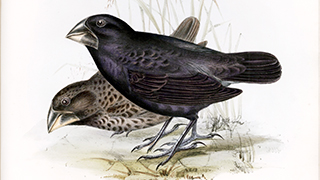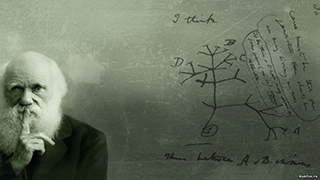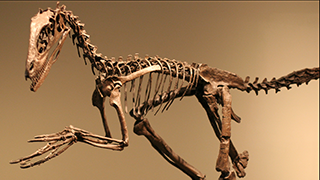The Electronic Scholarly Publishing Project offers links to the following to other sites
that may be of interest to the ESP community. Every effort is made to ensure
the relevance of the material and the validity of the links, but the
internet is dynamic and things may have changed since these materials were
last updated.
To report broken links, inappropriate content, or to make suggestions for
new links to be added,
CLICK HERE.
MendelWeb is an educational resource for teachers and students interested in
the origins of classical genetics, introductory data analysis, elementary plant
science, and the history and literature of science. Constructed around Gregor
Mendel's 1865 paper "Versuche über Pflanzen-Hybriden" and a revised
version of the English translation by C. T. Druery and William Bateson,
"Experiments in Plant Hybridization", MendelWeb is offered as a public
sourcebook and collaborative environment compatible with a variety of guided
and independent studies.
The Mendel Newsletter is an annual publication of the Library of
the American Philosophical Society promoting awareness of archival
resources for the history of genetics and allied sciences.
The Biology Project is an interactive online resource for learning
biology developed at The University of Arizona. The Biology Project
is fun, richly illustrated, and tested on 1000s of students. It has
been designed for biology students at the college and high school
level, but is useful for medical students, physicians, science
writers, and all types of interested people.
It includes a page dedicated to Mendelian Genetics.
The Dolan DNA Learning Center (DNALC) is the world's first science
center devoted entirely to genetics education and is an operating
unit of Cold Spring Harbor Laboratory, an important center for
molecular genetics research. The DNALC, DNALC West, and Harlem DNA
Lab extend the Laboratory's traditional research and postgraduate
education mission to the college, precollege, and public levels.
Flybase offers a Database of Drosophila Genes & Genomes. Beginning
with the work of Morgan's group at Columbia in the early 20th century,
Drosophila has been a workhorse for genetics research. Drosophila The
FlyBase project is carried out by a consortium of Drosophila
researchers and computer scientists at: Harvard University,
University of Cambridge (UK), Indiana University and the University
of New Mexico.
Project Gutenberg is the first and largest single collection of free
electronic books, or eBooks. Michael Hart, founder of Project
Gutenberg, invented eBooks in 1971 and continues to inspire the
creation of eBooks and related technologies today.
The Journal of Electronic Publishing (JEP) is a forum for research
and discussion about contemporary publishing practices, and the
impact of those practices upon users. Our contributors and readers
are publishers, scholars, librarians, journalists, students,
technologists, attorneys, retailers, and others with an interest in
the methods and means of contemporary publishing. At its inception
in January 1995, JEP carved out an important niche by recognizing
that print communication was in the throes of significant change,
and that digital communication would become an important — and
in some cases predominant — means for transmitting published
information.
As the leading ePublishing platform, HighWire Press partners with
independent scholarly publishers, societies, associations, and
university presses to facilitate the digital dissemination of 1334
journals, reference works, books, and proceedings. HighWire also
offers a complete manuscript submission, tracking, peer review, and
publishing system for journal editors, Bench>Press. HighWire provides
outstanding technology and support services, and fosters a dynamic
and innovative community, enhancing the strengths of each of its
members.
HighWire plays a unique role in the online publishing business, as
part of an academic library, a first-class research institution, and
an extension of the publishing world. HighWire is a partner and
colleague to scholarly societies who value the quality and content
of their journals and other materials. By working with HighWire,
publishers gain the economies of scale and networking opportunities
of working collaboratively in their business technology.
The National Science Digital Library is a national network dedicated
to advancing STEM (Science, Technology, Engineering and Mathematics)
teaching and learning for all learners and both formal and informal
settings, and the locus of activity for the National Science
Foundation's National STEM Distributed Learning program. NSDL receives
the majority of its funding through the generous support of NSF's
Division of Undergraduate Education (DUE), Directorate for Education
and Human Resources (EHR).
Google Scholar provides a simple way to broadly search for scholarly
literature. From one place, you can search across many disciplines
and sources: articles, theses, books, abstracts and court opinions,
from academic publishers, professional societies, online repositories,
universities and other web sites. Google Scholar helps you find
relevant work across the world of scholarly research.
Evolution was developed by Donald Forsdyke (of Queen's University,
Kingston, Ontario, Canada) to provide original works and contextual
commentary on matters relating to evolutionary thinking.
ECHO (Exploring and Collecting History Online) is a directory to
5,000+ websites concerning the history of science, technology, and
industry. You can search it, browse it according to category, or
even look at the tag cloud we've generated. Every website contains
a brief description (some examples are here), and occasionally, a
review (like these).
Online since 2002, The Complete Work of Charles Darwin Online (or
Darwin Online) is the largest and most widely consulted edition of
the writings of Darwin ever published. More copies of Darwin's works
have been downloaded from Darwin Online than have been printed by all
publishers of the past 180 years combined.
This website contains over 91,000 pages of searchable text and
209,000 electronic images, at least one exemplar of all known Darwin
publications, reproduced to the highest scholarly standards, both as
searchable text and electronic images of the originals. The majority
of these have been edited and annotated for the first time with
thousands of original editorial notes.
This website also provides the largest collection of Darwin's private
papers and manuscripts ever published: c. 20,000 items in c. 100,000
images, thanks primarily to the kind permission of Cambridge
University Library. Thus Darwin Online makes available not only
Darwin's published science, but the notes and data collected to create
it.
GALTON.ORG is edited and maintained by Gavan Tredoux on a voluntary basis.
All material provided on this site is made available in good faith for educational
and scholarly purposes only. The intention of the editor is to make everything
that Galton wrote available here, usually in facsimile format. The site now
runs to some 2 gigabytes of digitized material.
The American Museum of Natural History is one of the world's
preeminent scientific and cultural institutions. Since its founding
in 1869, the Museum has advanced its global mission to discover,
interpret and disseminate information about human cultures, the
natural world and the universe through a wide-ranging program of
scientific research, education and exhibition.
The Museum is renowned for its exhibitions and scientific collections,
which serve as a field guide to the entire planet and present a
panorama of the world's cultures.
The Smithsonian Institution in Washington DC is the world's largest
museum complex and research organization. It is composed of 19 museums, 9
research centers, and the National Zoo.
In the early 1990's,
Robert Robbins
was a faculty member at Johns
Hopkins, where he directed the informatics core of GDB
— the human gene-mapping database of the international human
genome project. To share papers with colleagues around the world, he
set up a small paper-sharing section on his personal web page. This
small project evolved into The Electronic Scholarly
Publishing Project.
In 1995, Robbins became the VP/IT of the Fred Hutchinson Cancer Research
Center in Seattle, WA. Soon after arriving in Seattle, Robbins secured
funding, through the ELSI component of the US Human Genome Project, to
create the original ESP.ORG web site, with the formal goal of
providing free, world-wide access to the literature of classical genetics.
Although the methods of molecular biology can seem almost
magical to the uninitiated, the original
techniques of classical genetics are readily appreciated by one and
all: cross individuals that differ in some inherited trait, collect
all of the progeny, score their attributes, and propose mechanisms
to explain the patterns of inheritance observed.
In reading the early works of classical genetics, one is drawn, almost
inexorably, into ever more complex models, until molecular explanations
begin to seem both necessary and natural. At that point, the tools
for understanding genome research are at hand. Assisting readers reach
this point was the original goal of The Electronic Scholarly Publishing
Project.
Usage of the site grew rapidly and has remained high. Faculty began
to use the site for their assigned readings. Other on-line
publishers, ranging from The New York Times to Nature
referenced ESP materials in their own publications. Nobel laureates
(e.g., Joshua Lederberg) regularly used the
site and even wrote to suggest changes and improvements.
When the site began, no journals
were making their early content available in
digital format. As a result, ESP was obliged to digitize classic
literature before it could be made available. For many important
papers — such as
Mendel's original paper
or the
first genetic map
— ESP had to produce entirely new typeset versions of the works,
if they were to be available in a high-quality format.
Early support from the DOE component of the Human Genome Project was
critically important for getting the ESP project on a firm foundation.
Since that funding ended (nearly 20 years ago), the project has been
operated as a purely volunteer effort.
Anyone wishing to assist in these efforts should send an
email to Robbins.




